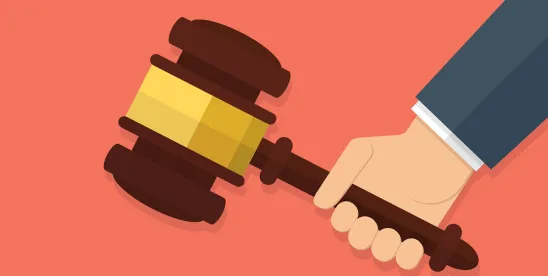The Court’s opinion resolves a circuit split concerning the reach of disgorgement orders.
In a unanimous decision, the US Supreme Court has ruled in Kokesh v. SEC that the five-year statute of limitations in 28 U.S.C. § 2462 applies to claims for disgorgement in enforcement actions brought by the US Securities and Exchange Commission (SEC).
This decision has implications for investigations involving potential violations of the federal securities laws, including those involving allegations of Foreign Corrupt Practices Act (FCPA) violations, insider trading, offering fraud, market manipulation, and broker-dealer and investment adviser fraud.
Background
In 2009, the SEC filed a civil enforcement action against New Mexico investment adviser Charles Kokesh alleging that Kokesh misappropriated funds from four business development companies from 1995 through 2009 and concealed the misappropriation by making false and misleading SEC filings. Kokesh was found liable in a jury trial and ordered in April 2015 to disgorge nearly $35 million in ill-gotten gains, in addition to a $2.4 million civil penalty and $18 million in pre-judgment interest. Kokesh appealed to the US Court of Appeals for the Tenth Circuit, arguing that the disgorgement order was a “penalty” and therefore subject to 28 U.S.C. § 2462, which creates a five-year statute of limitations for the enforcement of “any civil fine, penalty, or forfeiture, pecuniary or otherwise.”[1]
In August 2016, the Tenth Circuit affirmed the order, holding that disgorgement of ill-gotten gains was neither a penalty nor a forfeiture and therefore was not subject to the five-year statute of limitations.[2] In doing so, the Tenth Circuit widened an existing circuit split between the DC Circuit and the First Circuit on the one hand, which both had held that disgorgement was not subject to § 2462,[3] and the Eleventh Circuit on the other hand, which had recently held in SEC v. Graham4] that § 2462 did apply to disgorgement because it was synonymous with forfeiture.
The Supreme Court’s Opinion
On June 5, the Supreme Court resolved the circuit split, holding that disgorgement is a penalty under 28 U.S.C. § 2462 because it seeks to redress a wrong against the United States instead of a private individual and because its primary purpose is as a deterrent and not compensatory.[5] Writing for a unanimous court, Justice Sonia Sotomayor opened the opinion by noting that in SEC cases, federal courts historically ordered disgorgement in the absence of statutory civil penalties. In 1990, Congress authorized the SEC to seek statutory monetary penalties for securities law violations, and the Supreme Court held in 2013 that such penalties were limited by § 2462.[6]
With respect to disgorgement, the Supreme Court observed that its definition of a “penalty” turns on two principles: First, a sanction is more likely to be penal in nature where it seeks to redress a public wrong—rather than harm to an individual—because “[p]enal laws, strictly and properly, are those imposing punishment for an offense committed against the State.”[7] Second, a sanction operates as a penalty if its purpose is to punish and to deter rather than to compensate specific victims for identifiable losses.
Applying these principles, the Supreme Court held that SEC disgorgement constitutes a penalty under § 2462 for three reasons:
-
Disgorgement is imposed for violations of “public laws” because the violation “is committed against the United States rather than an aggrieved individual.”[8] As Justice Sotomayor observed, the SEC conceded as much by stating in its brief that it seeks disgorgement “to remedy harm to the public at large, rather than standing in the shoes of particular injured parties.”[9]
-
The primary purpose of disgorgement is punitive.[10]
-
SEC disgorgement, unlike an award of damages, does not necessarily serve to compensate private injury because federal courts have the discretion to apportion disgorgement proceeds as they wish between victims and the US Treasury and are under no obligation to distribute any disgorgement funds to victims.
In sum, the Supreme Court stated, “SEC disgorgement thus bears all the hallmarks of a penalty: It is imposed as a consequence of violating a public law and it is intended to deter, not to compensate.”[11]
In so holding, the Supreme Court found the SEC’s argument—that disgorgement is “remedial,” not punitive—to be untenable, reasoning that “SEC disgorgement sometimes exceeds the profits gained as a result of the violation” such that a defendant may be left worse off than before. The Court pointed to insider trading as an example; defendants convicted of insider trading may be ordered to disgorge not only their own ill-gotten gains but also any benefits accruing to third parties that still could be traced to their wrongdoing. Additionally, disgorgement is sometimes ordered “without consideration of a defendant’s expenses that reduced the amount of illegal profit,” which would go beyond restoring the status quo and leave a defendant worse off than before.[12] Although the Supreme Court ultimately did not disagree that disgorgement may serve a compensatory purpose as well, it placed heavy emphasis on disgorgement as a deterrent sanction—one whose punitive character places it well within the ambit of § 2462.
Implications of the Supreme Court’s Opinion
Kokesh will have direct and immediate implications for respondents and defendants negotiating settlements with or litigating against the SEC and the US Department of Justice (DOJ). In the past, both the SEC and DOJ have regularly sought disgorgement without limitation—extending back to the first date of any alleged misconduct and without any credit for taxes paid or for many other types of business expenses—rendering the disgorgement calculation disconnected from corporate defendants’ business realities.
Going forward, respondents and defendants are well-positioned to argue that any disgorgement sought must extend no further than five years from the date a claim accrued, assuming there are not facts strongly suggesting an ongoing scheme that can be tied to an earlier date. It remains to be seen whether respondents and defendants that have recently executed settlement agreements with the SEC will be successful in renegotiating those agreements on the grounds that the law has now been clarified. Further, the SEC and DOJ may look to accelerate existing investigations and cases based on potential amounts of disgorgement, timing, and fact patterns of misconduct.
The SEC can be expected to try to end-run the Kokesh decision by arguing fraudulent concealment of the conduct at issue or that the wrongdoing represented a “continuing course of conduct” that began before, but continued into, the five-year limitation period. Accordingly, as part of their defensive strategies, respondents and defendants should consider how best to demonstrate distinct patterns of conduct to counter the argument that individual acts or violations were part of an inter-related, ongoing scheme. In addition, for in-house compliance and legal teams, the Supreme Court’s ruling further incentivizes robust policing of internal policies and procedures so that any identified wrongdoing can be definitively halted.
The Supreme Court’s evident skepticism about the remedial nature of prior disgorgement awards that were “ordered without consideration of defendant’s expenses that reduced the amount of illegal profit”[13] should encourage defendants to argue for greater offsets to SEC disgorgement demands. Tellingly, the Court noted that “[n]othing in this opinion should be interpreted as an opinion on whether courts possess authority to order disgorgement in SEC enforcement proceedings or on whether courts have properly applied disgorgement principles in this context.”[14]
In the face of Gabelli and Kokesh, the SEC must now conduct its investigations more quickly, file enforcement actions more readily, and characterize alleged fraudulent activity more frequently as part of a single continuing act, in order to minimize the effect of the statute of limitations. Whether Kokesh will lead to additional cutbacks in the scope of disgorgement remains to be seen in future cases.
[1] 28 U.S.C. § 2462.
[2] SEC v. Kokesh, No. 15-2087, 834 F.3d 1158 (10th Cir. 2016).
[3] See Riordan v. SEC, 627 F.3d 1230, 1234 (D.C. Cir. 2010); SEC v. Tambone, 550 F.3d 106, 148 (1st Cir. 2008).
[4] No. 14-13562, 823 F.3d 1357 (11th Cir. 2016).
[5] Kokesh v. SEC, No. 16-529, 2017 WL 2407471, at *7-8 (June 5, 2017).
[6] Gabelli v. SEC, 568 U.S. 442, 454 (2013).
[7] 2017 WL 2407471, at *6.
[8] Id. at *7.
[9] Id. (quoting Brief for SEC at 22).
[10] Id.
[11] Id. at *8.
[12] Id.
[13] Id. at *8.
[14] Id. at *5 n.3.




 />i
/>i

